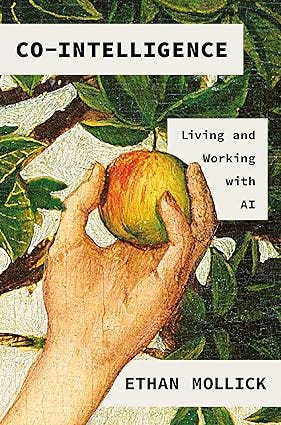Applause with some rebuttal: Co-Intelligence, by Ethan Mollick
A good book, though I have my reservations on some aspects.
I've read
posts, and was interested in a deeper view into his balanced opinions on AI.What to Expect
An 'outsider's' take on AI.
is a business academic, not an AI researcher, and has been investigating, using, and adapting LLMs in both business and teaching contexts. That gives him a good perspective on the utility and implications of the technology.The book is structured in two parts. First is around the promise, the problems, and sensible engagement rules for Generative AI. The second part explores Gen AI usages around work and teaching, and ends with exploring four possible futures about how AI might develop and the possible impacts it would have.
What I liked
I appreciated Mollick not shying away from the problems around Gen AI — both in terms of the technical frontier as well as the ethical implications. In my view he could have gone further exploring that, rather than settling for stating it, accepting and moving on. He notes that we, as a society, must come to terms with it and decide on acceptable usage, but while he offers advice on how to integrate GenAI into our working lives he doesn't offer the same in terms of broader ethical frameworks.
That said, much of the problems with Generative AI are not with the technology itself (it’s just a tool) but with the companies that build it. You know, those who think ‘stuff they found on the internet’ is free, just like ‘stuff they found in the neighbour’s shed.’ This is more solvable (well, theoretically, perhaps not in the current political climate), which still leaves the main tenets Mollick posits as foundational to working with AI as the right direction.
What to be aware of
The book only focuses on LLMs, with little about other generative models or types of AI (such as predictive systems). The focus isn't on explaining the technical details, but on abstracting rules to maximise utility while the technology keeps evolving. This is a good position (as the AI landscape shifts rapidly).
Mollick is also very bullish about AI enabling everyone to perform at higher capacity, with lesser skilled individuals benefiting the most. The research I have seen (some published after the book was written and published), is more ambivalent. It is not yet clear if novices or experts benefit more, how this interplays across domains, and the long-term effects on overall skill levels.
A Creative’s Perspective
I am both a creative (fantasy author) and working with AI for my day job. Mollick does make a distinction between creative tasks versus creating art. He naturally focuses on the tasks at work that require creativity. In my view, many people in the AI world (and tech in general) miss the art aspect — which in turn makes them misunderstand some of the 'applied art' process, namely those creative tasks.
It is my view that this is a spectrum, a gamut, with fuzzy lines. You can't be 'just' a graphic designer without having an eye for visual art, you can't be 'just' a copywriter without understanding stroytelling. Conversely, the artistic process informs and enhances the more task-oriented creative process.
While defining what is art is complex, from a practical perspective I like to say that art is half observation and half expression. It's why painters learn to observe and draw shapes and light, and why authors must read voraciously. Art does not exist in vacuum, but is a response to what came before it and the world around the artist. The spark lies in the insights from observation and the journey of expression.
My fear, therefore, is that when applied to creative tasks Generative AI will force a regression to the mean — it may elevate the novice, but as a crutch that won’t lead to building expertise; and it may also hamper the expert, who stops struggling when the AI is ‘good enough.’
Summary
It's well written, practical advice, and will remain current for the next few years as AI improves. As we (humanity at large) will be forced to interface and interact with AI systems more and more, the guidelines presented by Mollick will be practical to almost anyone. Considering who reads this blog, I’d recommend it.



